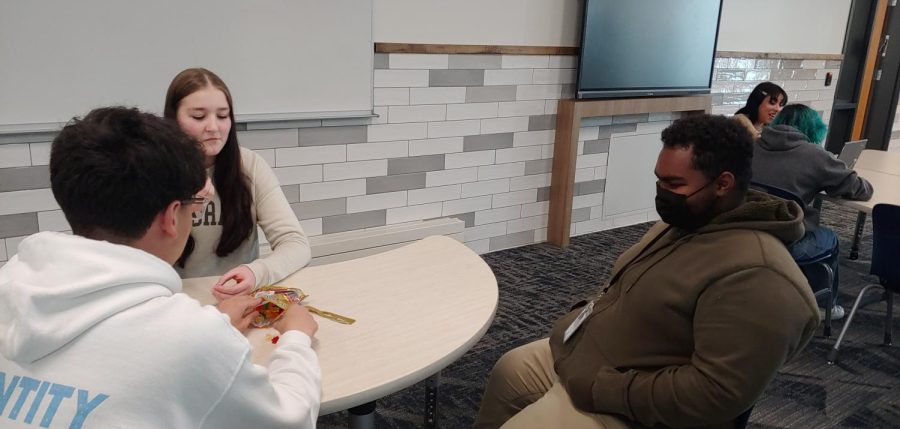Muslim students share in fasting during holy month of Ramadan
Greeley West student Musab Aden sits with a classmate who is eating Gummy Bears during class. For Aden, it’s a constant reminder of his fast and his faith as a Muslim.
April 4, 2023
In the Islamic calendar, Muslims are celebrating Ramadan. For many, not much changes. But for Muslims around the world, their day-to-day lives look drastically different as they observe this holy month. “The first day of Ramadan is the most difficult,” said Greeley West sophomore Musab Aden. “You have to wake up at three in the morning just to eat, and prepare yourself to put more focus on your faith.”
Aden, like over a billion people worldwide, has been participating in Sawm, the religious abstinence from all food and drink from sunrise to sunset. Ramadan began on March 22. “It’s rough on your body, but you have to do it, since it’s the month that God forgives your sins,” Aden explained. “You give up food, and grow in empathy and care.”
Naturally, school lunch can be difficult for Muslim students during Ramadan. They may have to remind themselves of why they are fasting, as their peers eat during the middle of the day. “Lunches are challenging,” admitted freshman Rasid Amanullah. “There’s food everywhere, so I often go outside and play sports to keep my mind off of it. It can get tiring, and you feel the need to eat and drink, but you keep committed.”
Aden said that not drinking water is the hardest part of the fast. “You know how when you’re hungry, you start not feeling hungry after a while? For water, it’s a constant headache that instantly goes away once you have some,” Aden said. After a week, you stop noticing you’re fasting for food. But you never stop noticing that you’re fasting from water.
For some, this lack of hydratyion and sustinenace can lead to greater troubles than temptation. “There are health risks associated,” Aden said. “My sister passed out last Ramadan. She didn’t eat or drink in the morning, and passed out in the afternoon. Beginners, like young kids, might not be able to make it all the way until sundown. I think they should start out by fasting until lunch, and delaying lunch if they can.”
For reasons outlined by Aden, young children, the elderly, and those with illnesses – acute or chronic – are not obliged to fast during Ramadan. To combat some of the energy fatigue, Muslim families share a large meal before the sunrise each day called suhur. The nightly feast is called iftar.
Aden explained that Ramadan is also a time that many Muslims around the world make their pilgrimate to Mecca. This is one of the pillars of the Islam faith and the Hajj is completed at least once during a person’s lifetime.
After Ramadan, Muslims break the month-long fast with the celebration of Eid al-Fitr, which typically include prayers and feasts. As one of two Islamic holidays, it can be a big deal to some. Amanullah said, “My family wakes up early for prayer, then we go to a farm to buy goats and cows and prepare them for eating ourselves. We donate half of the meat, and cook the rest for the feast. After a month of fasting, it’s a nice change of pace.”
Ramadan is a struggle and a commitment even non-Muslims can respect. Language acquisition teacher Ms. Erin Sandhoff said, “Overall, it’s a commitment of faith. As a Christian, it’s certainly admirable to watch a culture be so proud of their celebrations that they hold no reservations about it, even though many of their classmates are not Muslim.”











